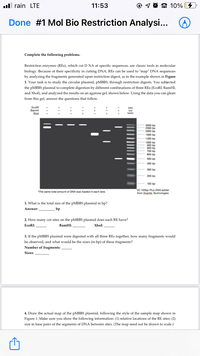
Concept explainers

Trending nowThis is a popular solution!
Step by stepSolved in 2 steps with 1 images

1. Briefly explain why the total size of the pMBBS plasmid in the Restriction Enzymes practical is 3000bp (base pairs)
2. Briefly explain why the cut sites on the pMBBS plasmid in each Restriction Enzymes (EcoRI, BamHI, and XhoI) just 1 each
3. Briefly explain what led to the 5 fragments formed which linked to the 500bp, 1000bp, 1500bp, 2000bp, 2500bp sizes
1. Briefly explain why the total size of the pMBBS plasmid in the Restriction Enzymes practical is 3000bp (base pairs)
2. Briefly explain why the cut sites on the pMBBS plasmid in each Restriction Enzymes (EcoRI, BamHI, and XhoI) just 1 each
3. Briefly explain what led to the 5 fragments formed which linked to the 500bp, 1000bp, 1500bp, 2000bp, 2500bp sizes
- DNA Restriction, Electrophoresis 1. What are restriction enzymes? 2. How do restriction enzymes function? 3. Why are restriction enzymes important in biochemistry labs? 4. What is DNA Gel Electrophoresis? 5. How does DNA Gel Electrophoresis function? 6. Why is DNA Gel Electrophoresis important in biochemistry labs?arrow_forwardPlease ASAP. Thank youarrow_forwardplease write neatlyarrow_forward
- Can you help with q 1 pleasearrow_forwardPreparing plasmid DNA (double stranded, circular) for Sanger sequencing involves annealing a complementary, single-stranded oligonucleotide DNA primer to one strand of the plasmid template. This is routinely accomplished by heating the plasmid DNA and primer to 90°C and then slowly bringing the temperature down to 25°C. Why does this protocol work? What enzyme is used and what other components are required in the sequencing reaction? How does the Sanger method determine the sequence?arrow_forwardPlease do not copy from anywherearrow_forward
 Human Anatomy & Physiology (11th Edition)BiologyISBN:9780134580999Author:Elaine N. Marieb, Katja N. HoehnPublisher:PEARSON
Human Anatomy & Physiology (11th Edition)BiologyISBN:9780134580999Author:Elaine N. Marieb, Katja N. HoehnPublisher:PEARSON Biology 2eBiologyISBN:9781947172517Author:Matthew Douglas, Jung Choi, Mary Ann ClarkPublisher:OpenStax
Biology 2eBiologyISBN:9781947172517Author:Matthew Douglas, Jung Choi, Mary Ann ClarkPublisher:OpenStax Anatomy & PhysiologyBiologyISBN:9781259398629Author:McKinley, Michael P., O'loughlin, Valerie Dean, Bidle, Theresa StouterPublisher:Mcgraw Hill Education,
Anatomy & PhysiologyBiologyISBN:9781259398629Author:McKinley, Michael P., O'loughlin, Valerie Dean, Bidle, Theresa StouterPublisher:Mcgraw Hill Education, Molecular Biology of the Cell (Sixth Edition)BiologyISBN:9780815344322Author:Bruce Alberts, Alexander D. Johnson, Julian Lewis, David Morgan, Martin Raff, Keith Roberts, Peter WalterPublisher:W. W. Norton & Company
Molecular Biology of the Cell (Sixth Edition)BiologyISBN:9780815344322Author:Bruce Alberts, Alexander D. Johnson, Julian Lewis, David Morgan, Martin Raff, Keith Roberts, Peter WalterPublisher:W. W. Norton & Company Laboratory Manual For Human Anatomy & PhysiologyBiologyISBN:9781260159363Author:Martin, Terry R., Prentice-craver, CynthiaPublisher:McGraw-Hill Publishing Co.
Laboratory Manual For Human Anatomy & PhysiologyBiologyISBN:9781260159363Author:Martin, Terry R., Prentice-craver, CynthiaPublisher:McGraw-Hill Publishing Co. Inquiry Into Life (16th Edition)BiologyISBN:9781260231700Author:Sylvia S. Mader, Michael WindelspechtPublisher:McGraw Hill Education
Inquiry Into Life (16th Edition)BiologyISBN:9781260231700Author:Sylvia S. Mader, Michael WindelspechtPublisher:McGraw Hill Education





